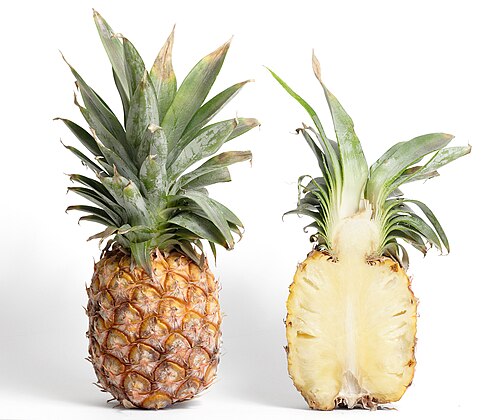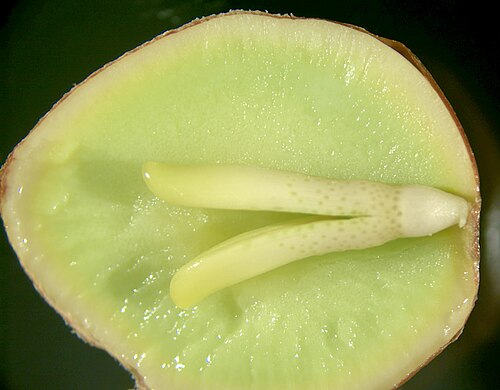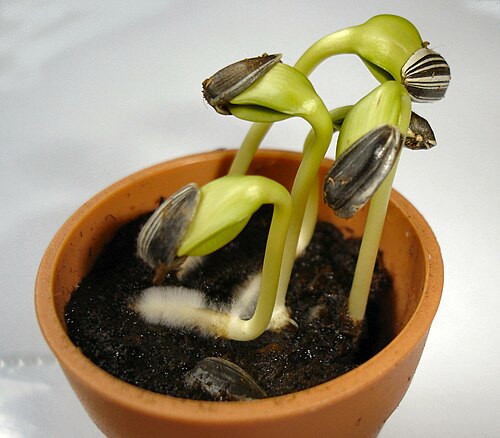Fruitnoun
(botany) The seed-bearing part of a plant, often edible, colourful/colorful and fragrant, produced from a floral ovary after fertilization.
Fruitnoun
Any sweet, edible part of a plant that resembles seed-bearing fruit, even if it does not develop from a floral ovary; also used in a technically imprecise sense for some sweet or sweetish vegetables, such as rhubarb, that resemble a true fruit or are used in cookery as if they were a fruit.
Fruitnoun
An end result, effect, or consequence; advantageous or disadvantageous result.
Fruitnoun
Offspring from a sexual union.
Fruitnoun
A homosexual or effeminate man.
Fruitnoun
modifier}} Of, pertaining to, or having fruit; of living things producing or consuming fruit.
Fruitverb
To produce fruit, seeds, or spores.
Fruitnoun
Whatever is produced for the nourishment or enjoyment of man or animals by the processes of vegetable growth, as corn, grass, cotton, flax, etc.; - commonly used in the plural.
Fruitnoun
The pulpy, edible seed vessels of certain plants, especially those grown on branches above ground, as apples, oranges, grapes, melons, berries, etc. See 3.
Fruitnoun
The ripened ovary of a flowering plant, with its contents and whatever parts are consolidated with it.
Fruitnoun
The spore cases or conceptacles of flowerless plants, as of ferns, mosses, algae, etc., with the spores contained in them.
Fruitnoun
The produce of animals; offspring; young; as, the fruit of the womb, of the loins, of the body.
Fruitnoun
That which is produced; the effect or consequence of any action; advantageous or desirable product or result; disadvantageous or evil consequence or effect; as, the fruits of labor, of self-denial, of intemperance.
Fruitverb
To bear fruit.
Fruitnoun
the ripened reproductive body of a seed plant
Fruitnoun
the consequence of some effort or action;
Fruitnoun
an amount of a product
Fruitverb
cause to bear fruit
Fruitverb
bear fruit;
Fruit
In botany, a fruit is the seed-bearing structure in flowering plants that is formed from the ovary after flowering. Fruits are the means by which flowering plants (also known as angiosperms) disseminate their seeds.
Seednoun
(countable) A fertilized grain, initially encased in a fruit, which may grow into a mature plant.
Seednoun
A fertilized ovule, containing an embryonic plant.
Seednoun
(uncountable) An amount of fertilized grain that cannot be readily counted.
Seednoun
(uncountable) Semen.
Seednoun
A precursor.
Seednoun
(countable) The initial state, condition or position of a changing, growing or developing process; the ultimate precursor in a defined chain of precursors.
Seednoun
The initial position of a competitor or team in a tournament. (seed position)
Seednoun
The competitor or team occupying a given seed. (seed position)
Seednoun
Initialization state of a pseudorandom number generator (PRNG). (seed number)
Seednoun
Commercial message in a creative format placed on relevant sites on the Internet. (seed idea or seed message)
Seednoun
Offspring, descendants, progeny.
Seednoun
Race; generation; birth.
Seednoun
A small bubble formed in imperfectly fused glass.
Seedverb
(transitive) To plant or sow an area with seeds.
Seedverb
(transitive) To cover thinly with something scattered; to ornament with seedlike decorations.
Seedverb
(transitive) To start; to provide, assign or determine the initial resources for, position of, state of.
Seedverb
To allocate a seeding to a competitor.
Seedverb
To leave (files) available for others to download through peer-to-peer file sharing protocols (e.g. BitTorrent).
Seedverb
(intransitive) To be qualified to compete, especially in a quarter-final, semi-final, or final.
Seedverb
(intransitive) To produce seed.
Seedverb
(intransitive) To grow to maturity.
Seedverb
To ejaculate inside the penetratee during intercourse, especially in the rectum.
Seedverb
(dialectal) see
Seednoun
A ripened ovule, consisting of an embryo with one or more integuments, or coverings; as, an apple seed; a currant seed. By germination it produces a new plant.
Seednoun
The generative fluid of the male; semen; sperm; - not used in the plural.
Seednoun
That from which anything springs; first principle; original; source; as, the seeds of virtue or vice.
Seednoun
The principle of production.
Seednoun
Progeny; offspring; children; descendants; as, the seed of Abraham; the seed of David.
Seednoun
Race; generation; birth.
Seedverb
To sow seed.
Seedverb
To shed the seed.
Seedverb
To grow to maturity, and to produce seed.
Seedverb
To sprinkle with seed; to plant seeds in; to sow; as, to seed a field.
Seedverb
To cover thinly with something scattered; to ornament with seedlike decorations.
Seednoun
a small hard fruit
Seednoun
a mature fertilized plant ovule consisting of an embryo and its food source and having a protective coat or testa
Seednoun
one of the outstanding players in a tournament
Seednoun
anything that provides inspiration for later work
Seednoun
the thick white fluid containing spermatozoa that is ejaculated by the male genital tract
Seedverb
go to seed; shed seeds;
Seedverb
help (an enterprise) in its early stages of development by providing seed money
Seedverb
bear seeds
Seedverb
place (seeds) in or on the ground for future growth;
Seedverb
distribute (players or teams) so that outstanding teams or players will not meet in the early rounds
Seedverb
sprinkle with silver iodide particles to disperse and cause rain;
Seedverb
inoculate with microorganisms
Seedverb
remove the seeds from;
Seed
A seed is an embryonic plant enclosed in a protective outer covering. The formation of the seed is part of the process of reproduction in seed plants, the spermatophytes, including the gymnosperm and angiosperm plants.






























